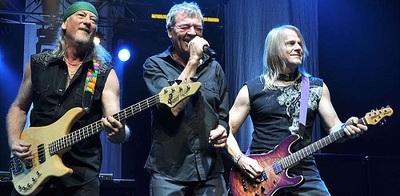Edgar Winter strapped on the keyboard for his big heavy 1972 instro hit, "Frankenstein." I went to the can, stood in line for beers, walked back, got lost, explained to the security dude how I left my ticket at my seat, sat down, chugged half a beer, and Edgar took another five minutes to wrap up the stomp. Generous albino, that Winter, and he did the same '70s thing with "Tobacco Road," along the way inviting us to take that Free Ride, reminiscing about Playing That Rock and Roll, insisting we Hoochie Koo it lawdy mama, scatting lotsa repeat-after-me vocal gymnastics with his burly guitar player and his funky pimped-out rhythm dudes, and repeatedly invoking the spirit of his deceased guitar-slinger bro Johnny. At 70, the hunched ol' mofo radiated such glee that only the sourest vaping hipster poet would have failed to boogie along, and the daylit amphitheater was already full when he hit the stage at 6:45, which tells you something about the strength of this bill and the durability of sacred Rock Entertainment.
Along with crude granite classics like "I'm Eighteen," "Under My Wheels" and "School's Out" (no "Elected," which mighta hit too close to home), Alice Cooper re-established his moldering prog credentials and earned my thanks via an inflated three-guitar workout from Tommy Henriksen, Ryan Roxie and sexy Nita Strauss on his 1971 spy hallucination "Halo of Flies." Tunes from more recent decades sparked with less invention, thus loading disproportionate tonnage onto the trademark visual vomit. A goofy 15-foot monster strolled the boards on "Feed My Frankenstein" as Cooper got electro-reanimated; he submitted his plaster head to a balky guillotine for the billionth time; his rape of a cadaver doll on "Cold Ethyl" aroused sneers rather than sniggers, which must mean I'm 18 no more. Well, what's Alice gonna do, retire? You can only play so much golf.
It's no surprise that guitarist Steve Morse's winding color wheel of a new showcase, "The Surprising," ranked as one of Deep Purple's pinnacles, cuz these guys are paid to improvise, and each night the band finds unexpected back pathways to keep themselves and us interested. Which doesn't mean they neglected "Highway Star," "Perfect Strangers" or "Smoke on the Water"; of course they jumped on those hosses like they rustled 'em at sundown. Dave said, "Watch Ian Paice," but I was already riveted – not by the original Purp drummer's pyrotechnics, but by the wrist-flicking ease with which he grooved each song, snapping out accents only when they counted most. Some think "tight" is like the lid on a jam jar, but in prime essence it refers to the weave of a finely threaded fabric – light, flexible and breatheable. The way Paice's blues coasted with bassist Roger Glover's hi-def drive stood as an induplicable subliminal marvel, a foundation that 10-handed keyboardist Don Airey (himself no slouch in rhythmic acuity) relished and exploited for all he was worth, and that's plenty considering he was able to replace the greatest keyboardist in rock history, Jon Lord. Ian Gillan sang with especially relaxed richness – seems these outdoor exposures let him fill his lungs with God's breath and exhale back the feeling that, as he made us believe in the triumphant "Uncommon Man," it's good to be king. Deep Purple saved their biggest surprise for last with the half-century-old chug-a-bumper "Hush," which became not only a dance mandate but a lesson in thrilling, ultrasophisticated chordal superimposition of a kind few jazz musicians would attempt. Don't know how they did it; not sure I want to.

